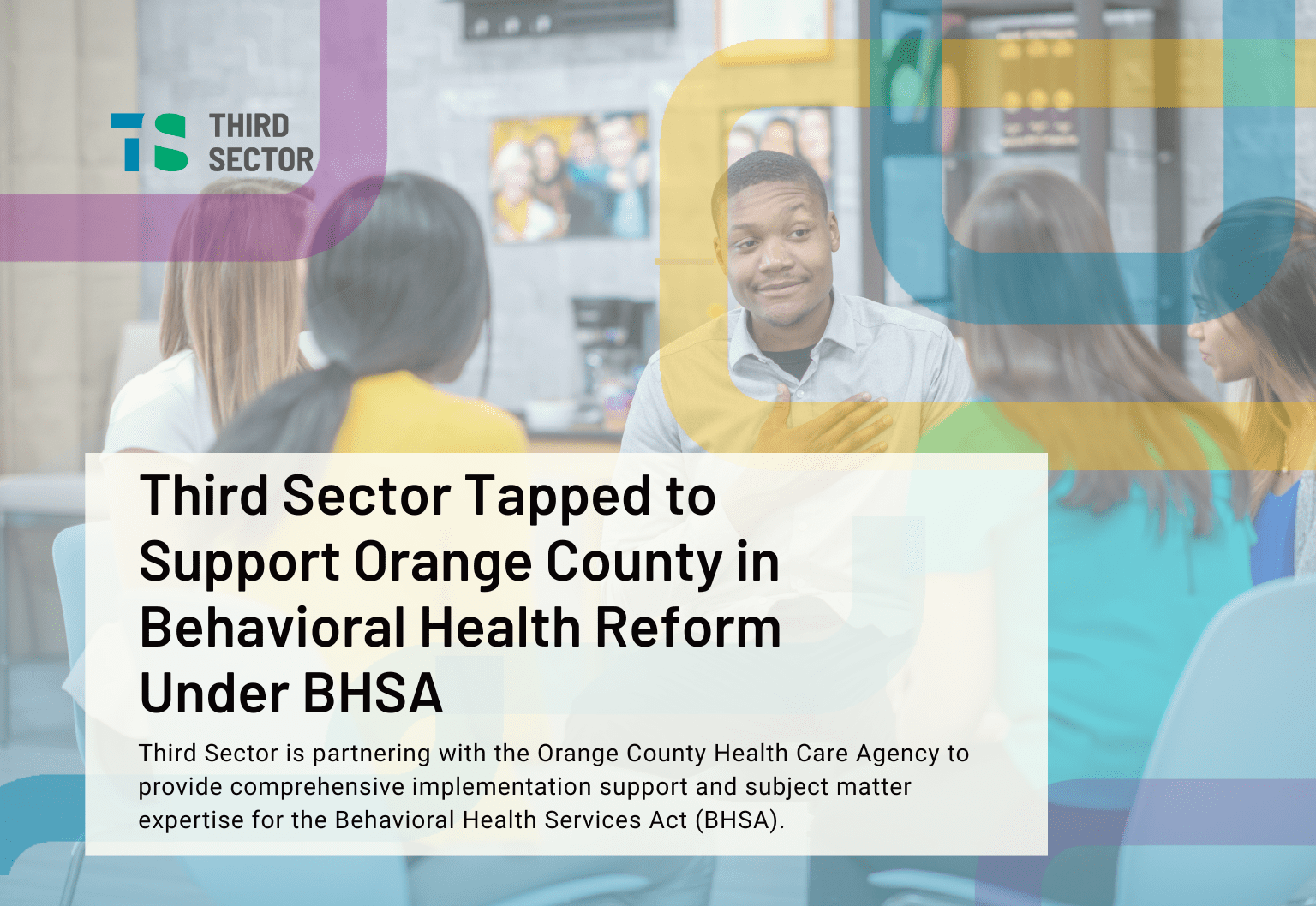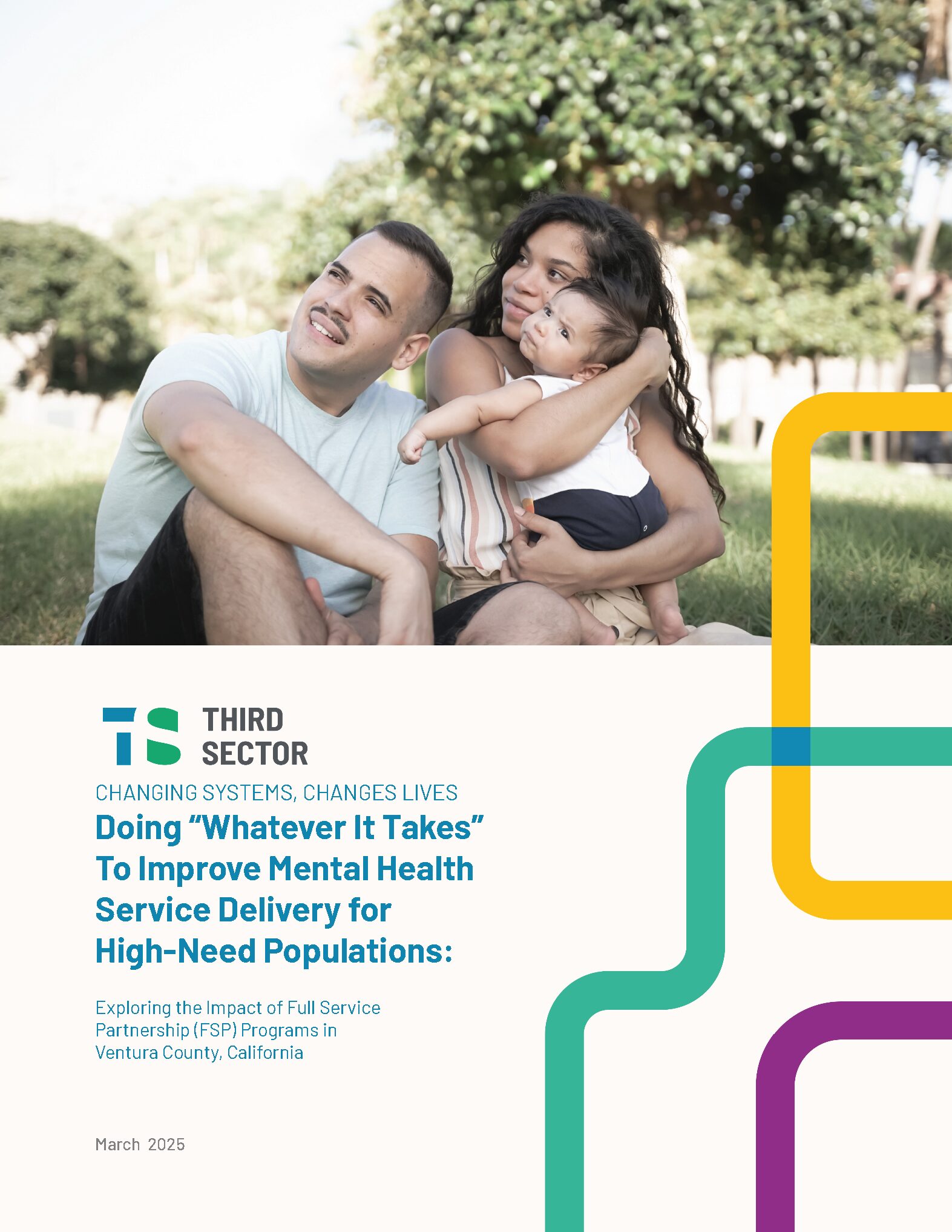Building a Movement: California Counties Come Together to Improve Mental Health Outcomes
As the mental health crisis continues to grow across the country, a group of eight California counties are taking an innovative approach to transforming critical mental health services. Over the past two years, counties have partnered to design ways to serve people more effectively and equitably as part of the Multi-County Full Service Partnership (FSP) Innovation Project. These improvements, which counties finalized in November 2021, have the potential to increase the consistency, quality, and effectiveness of care for Californians with the most serious mental health needs.

Partnering for Change
In California, $1 billion in public funds are invested annually in Full Service Partnerships (FSPs), which provide comprehensive community-based services for more than 60,000 individuals facing severe and persistent mental illness. FSP programs have tremendous potential to help individuals live fulfilling lives while reducing psychiatric hospitalizations, homelessness, and incarceration, yet service delivery and data processes vary significantly across counties, making it difficult to understand and tell a statewide impact story.
Spurred by desires for greater consistency, six counties – Fresno, Sacramento, San Bernardino, San Mateo, Siskiyou, and Ventura – kicked off the 4.5-year Multi-County FSP Innovation Project in 2020, building on Los Angeles County’s groundbreaking FSP redesign. The project marks the first time such a diverse coalition of counties has formed to improve FSPs across the state, ranging from small frontier communities to dense urban centers. Additional project partners include Third Sector as the technical assistance provider, California’s Mental Health Services Oversight and Accountability Commission (MHSOAC), the California Mental Health Services Authority (CalMHSA), the California Institute for Behavioral Health Solutions, and RAND Corporation as the third party evaluator.
Designing Improvements
The Multi-County FSP Innovation Project aims to improve counties’ abilities to collect and use data to understand who FSP is serving, what services they receive, and what outcomes are achieved. Findings from each county will contribute to statewide recommendations for creating more consistent programs that deliver on FSP’s “whatever it takes” promise. 
Guided by more than 200 interviews with FSP providers and individuals receiving services, the six counties came to consensus on definitions for key FSP Populations (e.g. individuals experiencing homelessness) and on key outcomes (e.g. obtaining stable housing). Counties also jointly developed recommendations for changes to the statewide data system to make it easier to access and use this data on an ongoing basis. Having more consistent definitions and data allows counties to assess relative areas of improvement and strengths across the state. These data can be used as tools to guide both resource investments and the sharing and adoption of best practices so that ultimately, people in California can access high-quality, equitable, and person-centered mental health services no matter where they live.
Counties simultaneously worked to improve FSP services locally, designing solutions based on their own unique contexts and community needs. For example, some counties refined their eligibility criteria to ensure that the highest need individuals are prioritized. Other counties established guidelines for “stepping down” from FSP into less intensive programs to make transitions smoother and give people more ownership over their own transition planning. And though each county approached their local improvements differently, they all benefited from collaboratively sharing tools, processes, and ideas.
“This project allowed Fresno County staff the opportunity to work collaboratively and cross-divisionally within the organization in new and exciting ways, strengthened existing relationships with FSP providers, and opened the door to future continuous improvement work.”
- Fresno County Department of Behavioral Health Staff Member
Building a Movement
Though the first phase of Third Sector’s technical assistance is winding down, the work is just beginning.  Over the next several years, counties will continue to implement and iterate on the local FSP improvements that they designed. In parallel, the cohort of counties will meet regularly to share outcomes data, identify best practices, and strategize service improvements. These conversations will be informed by RAND’s evaluation, which will tell the most comprehensive statewide impact story of FSPs to date. Learnings from the project and its evaluation will be shared broadly with the intent to help shape statewide policy and programming.
Over the next several years, counties will continue to implement and iterate on the local FSP improvements that they designed. In parallel, the cohort of counties will meet regularly to share outcomes data, identify best practices, and strategize service improvements. These conversations will be informed by RAND’s evaluation, which will tell the most comprehensive statewide impact story of FSPs to date. Learnings from the project and its evaluation will be shared broadly with the intent to help shape statewide policy and programming.
In an exciting step forward, two new counties – Lake and Stanislaus – have joined the project as a “second wave.” Both counties will spend the next two years working with Third Sector to develop their own local FSP improvements and build on the collaborative work of the original six counties.
The Multi-County FSP Innovation Project highlights the potential of cross-county collaboration to ignite a statewide movement dedicated to improving mental health services for individuals with the greatest needs. For other states across the country looking to support people on their paths to recovery and wellness, look to California’s example of building a coalition to improve mental health outcomes through more person-centered and data driven programs. View the Year 2 Summary Report here.



